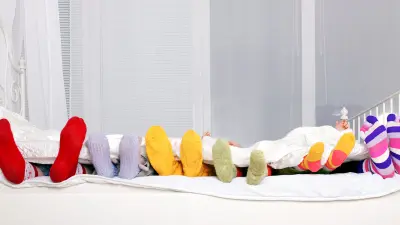Getting better sleep isn’t just about how long you rest — it’s about how consistent and high-quality that sleep is. According to neuroscientist Dr. Andrew Huberman (Stanford School of Medicine), the brain does a lot more than rest during sleep: it processes emotions, locks in memories, and even acts like a nightly therapy session.
Here are 7 simple but powerful tips (based on Dr. Huberman’s research) that can help the whole family — especially parents and kids — sleep better, feel more emotionally balanced, and boost their brain power.
Top Sleep Tips from Huberman Lab
1. Stick to a Sleep Schedule
“Getting 6.5 hours consistently is better than sleeping 8-10 hours randomly.” — Dr. Andrew Huberman
A regular sleep and wake-up time — even on weekends — trains your body and brain to know when it’s time to wind down and when it’s time to get going. This rhythm is crucial for both kids and adults.
Why it matters: Inconsistent sleep messes with your internal clock (circadian rhythm), reducing both REM and slow wave sleep, which are critical for memory, emotion regulation, and learning.
2. Cut Fluids Before Bed
Drinking a lot of water or juice right before bed increases the chances of your child — or you — waking up in the middle of the night to use the bathroom.
“A full bladder sends signals to the brainstem that wake us up.” — Dr. Huberman
Pro tip: Encourage bathroom visits before lights out and stop drinks 1–2 hours before bedtime for uninterrupted sleep.
3. Avoid Alcohol or THC at Night
Even if these substances seem to help you “relax,” they interfere with sleep quality — especially the REM phase, which is key for emotional reset, memory consolidation, and creativity.
“Alcohol, THC… disrupt the overall sequencing of more slow wave sleep early in the night and more REM sleep later in the night.” — Dr. Huberman
If you’ve ever felt groggy or emotionally off the day after a drink — even with a full 8 hours of sleep — this is likely why.
4. Be Cautious with Supplements Like 5-HTP
Many sleep supplements contain tryptophan or 5-HTP, which can alter serotonin levels. While serotonin helps with mood and restfulness, these compounds can disrupt the timing of your REM and deep sleep.
“Tryptophan and 5-HTP might shift sleep architecture in unintended ways.” — Dr. Huberman
If you’re using supplements, keep a close eye on how they affect your child’s or your own mood and sleep consistency.
5. Move Your Body (Especially Strength Training)
“Resistance exercise… increases the amount of slow wave sleep.” — Dr. Huberman
Engaging in strength-based activity — like push-ups, squats, or climbing — activates pathways that support growth hormone release, which is directly tied to deep sleep.
Why it matters: Slow wave sleep is when your brain stores facts and skills — essential for kids learning at school and for parents juggling mental loads.
Bonus: This can be fun and simple for kids. Try playground climbing, monkey bars, or resistance bands.
6. Try NSDR (Non-Sleep Deep Rest)
NSDR refers to restorative mental practices like Yoga Nidra or guided relaxation, which help calm the mind and body — especially useful if you wake up early or feel wired at bedtime.
“Even though it’s called Non-Sleep Deep Rest… it really allows me to relax and fall back asleep.” — Dr. Huberman
These tools are free, science-backed, and perfect for teaching kids and teens how to wind down or fall back asleep without panic.
7. Get Sunlight in the Morning ☀️
(From other Huberman Lab episodes — but worth including!)
Getting natural light exposure within 30–60 minutes of waking helps anchor your circadian rhythm, boosting daytime energy and making it easier to fall asleep at night.
Pro tip: Morning walks with the kids, breakfast near a sunny window, or standing outside for 5–10 minutes can do the trick.
Sleep Like Babies!
When kids (and parents) don’t sleep well:
- Emotions get harder to regulate
- Meltdowns and tantrums spike
- Learning and memory suffer
- The smallest issues feel overwhelming
But the good news? Improving sleep doesn’t require huge changes — just consistent, science-backed habits. And with tools like NSDR, morning light, and consistent routines, you can start seeing shifts in sleep quality and family dynamics fast.








Leave a Reply